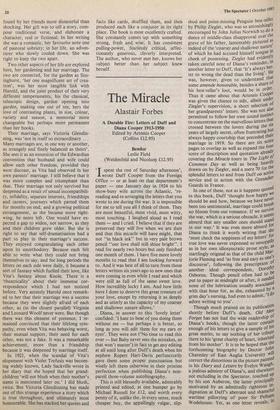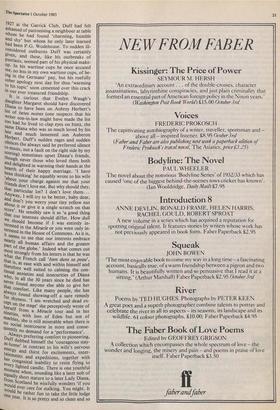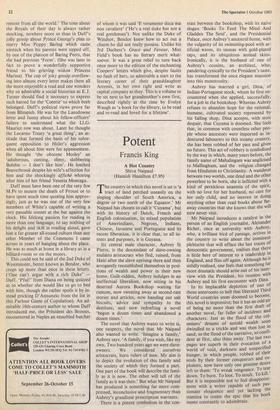The Miracle
Alastair Forbes
A Durable Fire: Letters of Duff and Diana Cooper 1913-1950 Edited by Artemis Cooper (Collins £12.95) Bendor Leslie Field (Weidenfeld and Nicolson £12.95) spent the rest of Saturday afternoon', wrote Duff Cooper from the Foreign Office — or at least on that department's paper — one January day in 1924 to his show-busy wife across the Atlantic, 're- reading and re-arranging the letters that you wrote to me during the war. It is impossible for me to tell you all I think of them. They are most beautiful, most vivid, most witty, most touching. I laughed aloud as I read them — and I cried. I believe that if they are preserved they will live when we are dust and that this miracle will have might, that not "in black ink" but in very pale brown pencil "our love shall still shine bright". I read for nearly two hours but only finished one month of them. I have five more lovely months to read that I am looking forward to. And it was best of all to turn from those letters written six years ago to new ones that were coming in even while I read and which were still as full of the same sweet love. How incredibly lucky I am. And how little have I done to deserve this great treasure of your love, except by returning it as deeply and as utterly as the capacity of my coarser and shallower nature allows.'
Diana, in answer to this 'lovely letter' confided: 'I hate to hear of you doing them without me — but perhaps it is better, so long as you will edit them for my ears or eyes'. They were not (`No time to read this over — but Baby never sees the mistakes, so that won't matter') in fact to get any editing at all until long after Duff's death when his nephew Rupert Hart-Davis perfunctorily gave them some proper punctuation but wisely left them otherwise in their pristine perfection when publishing Diana's non- pareil three-volume autobiography.
This is still blessedly available, admirably printed and edited, at one bumper go by Michael Russell for £12, and worth every penny of it, unlike the, in every sense, much cheaper buy, the appallingly vulgar, slip-
shod and point-missing Penguin best-seller by Philip Ziegler, who was so astonishinglY encouraged by John Julius Norwich to do a dance of middle-class disapproval over the grave of his father, lamentably pictured as indeed of the 'coarser and shallower nature of which he had accused himself tongue in cheek of possessing. Ziegler had evidentlY taken careful note of Diana's reminder, in another letter to Duff, that 'It's always bet- ter to wrong the dead than the living'. He was, however, given to understand that some amende honorable, besides a share of his best-seller's loot, would be in order. Thus it came about that Artemis Cooper was given the chance to edit, albeit under Ziegler's supervision, a short selection of her grandparents' letters. She was not alas permitted to follow her own sound instinct to concentrate on the marvellous letters that crossed between the lovers during the six years of largely secret, often frustrating but always happy courtship that preceded their marriage in 1919. So there are six score pages to overlap as well as expand the four score of description and quotation already covering the Miracle tours in The Light of Common Day as well as being heavily drawn on by Ziegler, and a mere 70 for the splendid letters to and from Duff on active service and in action with the Grenadier Guards in France. In one of these, not as it happens quoted in this book, Duff 'thought how happy we should be and how, because we have never been too sentimental, marriage could brush no bloom from our romance. If we survive the war, which is a serious obstacle, it seems, absurd that any smaller ones should stand in our way.' It was even more absurd for Diana to think it worth writing that she 'must check the soppiness of my letters' for true love was never expressed so unsoPPilY as in her own idiosyncratic prose style, as startlingly original as that of the child Mar- jorie Fleming and 'as free and easy as ones, discourse', following the prescription 0I another ideal correspondent, Dorothy Osborne. Though pencil often had to be put to paper at midnight or after, it needed none of the lubrication usually associated with that hour for, as she, exhausted by a grim day's nursing, had even to admit, cl0 adore writing to you'. Though much praised on its publication shortly before Duff's death, Old Men Forget has not had the wide readership of Diana's books, though the latter contain enough of his letters to give a sample of his great merits, to say nothing of her tribute there to his 'great charity of heart, inherited from his mother'. It is to be hoped that the forthcoming biography by Doctor Job „ Charmley of East Anglia University `HU; correct the distortions in the picture painted in his Diary and Letters by Evelyn Waugh' a jealous admirer of Diana's, and elsewhere not excluding in the Spectator, touched bP by his son Auberon, the latter principally motivated by an admittedly righteous in- dignation at Duff's aberrant and shameful wartime pillorying of poor Sir Pelham Wodehouse. Yet, as one letter reveals, in 1927 at the Garrick Club, Duff had felt ashamed of patronising a neighbour at table whom he had found 'charming, humble and shy' but whom he only later learned had been P.G. Wodehouse. To sudden ill- considered outbursts Duff was certainly given, and these, like his outbreaks of psoriasis, seemed part of his physical make- up. In his wartime cups he once accused me, no less in my own wartime cups, of be- ing in the Germans' pay, but his ruefully sober apology next day for thus 'warming to his topic' soon cemented over this crack In our ever treasured friendship.
It is curious that Evelyn Waugh's daughter Margaret should have discovered Diana to have been on Aubrey Herbert's list of betes noires (one suspects that his writer son-in-law might have made the list too had he lived to clap eyes on him), the same Diana who was so much loved by his late and much lamented son Auberon Herbert. Duff's sudden rages and sudden silences (he always said he preferred silence to music, not a fault on the right side by my scoring) sometimes upset Diana's friends, though never those who loved them both and delighted in warming their hands at the
hearth of their happy marriage. have been thinking' he equably wrote to his wife 'about your charge against me that your friends don't love me. But why should they, that Particular lot? I don't love them... 'InYway I will try to be better, baby dear, and don't you worry your tiny yellow nut about it or give it a single scratch on that score,. He sensibly saw it as 'a good thing that our interests should differ. How dull we should become if I was entirely in- terested in the Miracle or you were only in- terested in the House of Commons. As it is, it seems to me that our interests embrace nearly all human affairs and the greater Part of the globe.' Indeed what comes out Most strongly from his letters is that he was what the French call 'bien dans sa peau', that is, at ease with and within himself and therefore well suited to calming the con- tinual anxieties and insecurities of Diana who, in all the 30 years since he died has never found anyone else able to give her that comfort. Like many people, she has always found showing-off a sure remedy for shyness. 'I am wretched and dead ex- c, ept on the stage' she perceptively wrote of herself from a Miracle tour and in her
nineties, with loss of Eden but not of Marbles, she is still miserable when there is no social intercourse in store and conse- quently no demand for a 'performance'. Always preferring comfort to pioneering, Duff dubbed himself the 'courageous stay-
at-home' in contrast to his wife's nervous energy and thirst for excitements, enter- tainments and expeditions, together with ner
ever congenital inability to resist flying to .
Y lighted candle. There is one youthful moment when sounding like a later nob of equally short stature to a later Lady Diana, from Scotland he wistfully wonders 'if you Would ever care for stalking. You might. It Would be rather fun to take the little lodge one year. It is so pretty and so clean and so remote from all the world.' The tone about the Royals of their day is always rather mocking, nowhere more so than in Duff's jolly gossip about Prince George's plan to marry Miss Poppy Baring which came unstuck when his parents were tipped off, by one of the platoon of Baring Peers, that she had previous 'Form'. (She was later in fact to prove a wonderfully supportive friend to his grieving widow Princess Marina). The cup of joky gossip overflow- ing into almost every letter makes them all the more enjoyable a read and one wonders why so admirable a social historian as E.J. Turner should find it necessary to express such hatred for the 'Coterie' to which both belonged. Duff's political views prove far from Blimpish. He was for the Lansdowne letter and funny about his fellow-officers' failure to understand what the LLG- Maurice row was about. Later he thought the Locarno Treaty 'a great thing', an at- titude that formed the basis of his subse- quent opposition to Hitler's aggression when all about him were for appeasement. He thought 'the obscene Mosley' an `adulterous, canting, slimy, slobbering Bolshie — I don't like him'. He loathed Beaverbrook despite his wife's affection for him and the shockingly affiche whoring after him of her friend Venetia Montagu.
Duff must have been one of the very few M.Ps to mourn the death of Proust or to have spent much time quoting him approv- ingly, just as he was one of the very few members of White's capable of writing a very passable sonnet at the bar against the clock. His lifelong passion for reading in more than one language, to say nothing of his delight and skill in reading aloud, gave him a far greater all-round culture than any other Member of the Commons I came across in years of hanging about the place. He was as much at home in a library as in a billiard-room or on the moors.
This could not be said of the 2nd Duke of Westminster, better known as Bendor, who crops up more than once in these letters. (`One can't argue with a rich Duke' Duff. `Pfuil ' from Diana on being quizzed as to whether she would like to go to bed with him, though she rather spoils it by in- stead pricking D'Annunzio from the list in this Parlour Game of Copulation). An ad- mirable 18th-century author to whom Duff introduced me, the President des Brosses, encountered in Naples an ennobled butcher
of whom it was said 'E veramente duca ma non cavaliere' (`He's a real duke but not a real gentleman'). Not unlike the Duke of Windsor, Bendor knew how to act out a charm he did not really possess. Unlike his 3rd Duchess's Grace and Favour, Miss Field's book has no literary merit what- soever. It was a great relief to turn back once more to the edition of the enchanting Coopers' letters which give, despite faults no fault of hers, so admirable a start to the literary career of their granddaughter Artemis, in her own right and write as capital company as they. This is a volume to be set next to her grandmother's own first, described rightly at the time by Evelyn Waugh as 'a book for the library, to be read and re-read and loved for a lifetime'.








































 Previous page
Previous page